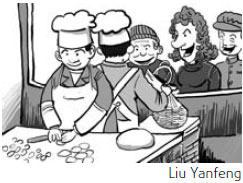Discovering a new neighborhood in the niu year
By Lisa Carducci ( China Daily ) Updated: 2009-02-19 08:56:09Shunyi is a large district of Beijing, offering impressive villas for foreigners with handsome incomes and wealthy Chinese from Hong Kong and Taiwan. This is not where I live. In my middle-class community, I am the only non-Chinese. Though I have been living in Beijing for almost 18 years and have traveled the whole country more than once, I found I still have something to discover.

The day before Chinese New Year's Eve, I went to the market to buy 200 jiaozi pi (wrappings for dumplings). I can make very nice jiaozi but I'm not good at making the little dough circles.
At 3 pm on Saturday, they were sold out but the vendor promised he would have some the next day, at 8 am. The next morning, when I arrived at the market, 15 people were already lining up but the vendor had not arrived.
Forty minutes later, a woman turned up with a bag of jiaozi pi in her hand. I asked her where she had bought them. And she replied: "At the maker's house." Immediately, people gathered around her asking "Where?"
"I will show you," she said and kindly led us to a hutong 200 m away. The jiaozi maker was covered with flour; he had been so busy since dawn that he was unable to leave for the market. He told us not to worry, that there would be enough for all of us.
After buying mine, I realized that other people could very likely be waiting at his counter in the market. So I went to tell them he would not come, and I accompanied them to his place.
How is it that after living for more than five years in my Shunyi compound, surrounded by rural areas, villages, and fields - the real countryside, in fact - I had never visited these hutongs?
On Chu Wu, the fifth day of the lunar New Year, people ate jiaozi again and filled the sky with fireworks and the sound of firecrackers. I realized that most of them were released from the countryside.
The next day, the weather was wonderful and inviting for a walk. Though most people in and around our compound know me, those in the village were suspicious of a foreigner strolling in their hutong.
But I addressed them in Chinese, wishing them a happy niu year, and they immediately relaxed and smiled.

Six children were playing "war" with tree branches; an old man was smoking a long iron pipe; a woman sitting in the sun was exercising her hands with two jade balls. Two tawny dogs were sleeping in the same position on a pile of firecracker refuse, while others were sniffing the garbage in search of something good. At one time, I could hear a celestial orchestra of pigeons with whistles fixed to their bodies - a time-honored tradition in Beijing. Over the roofs, water tanks were basking in the solar energy.
But what impressed me more was that half of these doors were wide open, and I discovered that behind them were siheyuan - the typical houses around a square courtyard.
Several of them were newly built. There were also two-story houses with lots of windows. I found the courtyards larger than those in downtown Beijing (or were they only less cluttered?).
In one of the courtyards, a middle-aged man was brushing a coat in a basin of hot water. Everywhere clothes and bedding had been hung to dry in the sun. This reminded me of Italy where big pottery jars and pots containing pickled vegetables, reserves of garlic braids, bunches of red pepper, and even dry corn cobs could be found hanging everywhere.
One thing remains a mystery: In front of almost every house, rows and rows of new bricks waited to be used. Will all these people develop their properties simultaneously? I didn't dare ask.
|
|
|
|
|
|
|
|


























 Raymond Zhou:
Raymond Zhou: Pauline D Loh:
Pauline D Loh: Hot Pot
Hot Pot Eco China
Eco China China Dream
China Dream China Face
China Face






